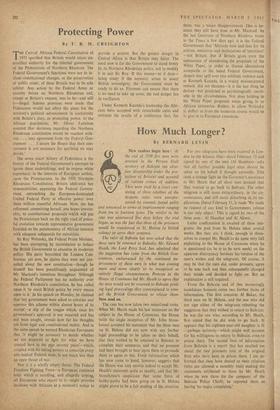How Much Longer?
By BERNARD LEVIN
The ruler of Bahrain has now asked that the three men be returned to Bahrain; Mr. Edward Heath, the Lord Privy Seal, has admitted that the suggestion has come from the British Gov- ernment, embarrassed by the continued im- prisonment of these men in what was Coming more and more clearly to be recognised as entirely illegal circumstances. Protests in the House of Commons led Mr. Heath to agree that the men would not be returned to Bahrain pend- ing legal proceedings they contemplated to com- pel the ,British Government to release them. Now read on.
The case has now taken two sensational turns. When Mr. Heath made his last statement on the subject in the House of Commons, the House (with the single exception of Mr. John Stone- house) accepted his statement that the three men on St. Helena did not now wish any further legal proceedings to be taken on their behalf, that they wished to be returned to Bahrain to
complete their sentences, and that no pressure had been brought to bear upon them to persuade them to agree to this. Fresh information which has now come to hand, however, suggests that the House was very unwise indeed to accept Mr. Heath's statement quite so readily, and that Mr.
Stonehouse's suspicions that some form of hanky-panky had been going on in St. Helena might prove to be a fair reading of the situation.
For two telegrams have been received in Lon- don by the defence. One—dated February 13 and signed by one of the men (Al Shamlan)—asks that all further possible legal steps should be taken on his behalf if thought advisable. This casts a strange light on the Governor's assurance to Mr. Heath that all three men insisted that they wanted to go back to Bahrain. The other telegram is still more extraordinary, in the cir: cumstances, and still more disturbing in. its im- plications. Dated February 11, it reads 'We made no request of any kind to Government; release is our only object.' This is signed by two of the three men: Al Shamlan and Al Aliwat.
Letter confirmation is awaited of these tele- grams; the post from St. Helena takes several weeks. But they are, I think, enough in them- selves to compel Mr. Heath to do some very full explaining to the House of Commons when he is questioned (as he is to be next week) on the apparent discrepancy between his -version of the men's wishes and the telegrams. Of course, it may be that the men did, under pressure, agree to be sent back and then subsequently changed their minds and decided to fight on. But an explanation is still required.
From the Bahrain end of this increasingly scandalous business come two further items of information. The first concerns Al Bakar, the third man on St. Helena, and the one who did not sign either of the telegrams rebutting the suggestion that they wished to return to Bahrain; he was the one who, according to Mr. Heath, first stated that he did wish to go back. It appears that his eighteen-year-old daughter is ill —perhaps seriously--which might well account for his willingness to return to Bahrain, even to prison there. The second item of information from Bahrain is a report that has reached me about the two- prisoners (out of the original
five) who have been in prison there. I am in- formed that they have denied to their relatives (who are allowed a monthly visit) making the statements attributed to them by Mr. Heath when he saw them (in the company of the Bahrain Police Chief); he reported them as having `no major complaints.'






































 Previous page
Previous page